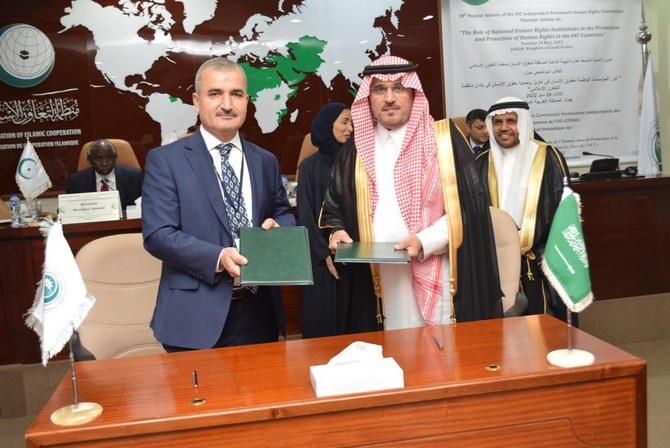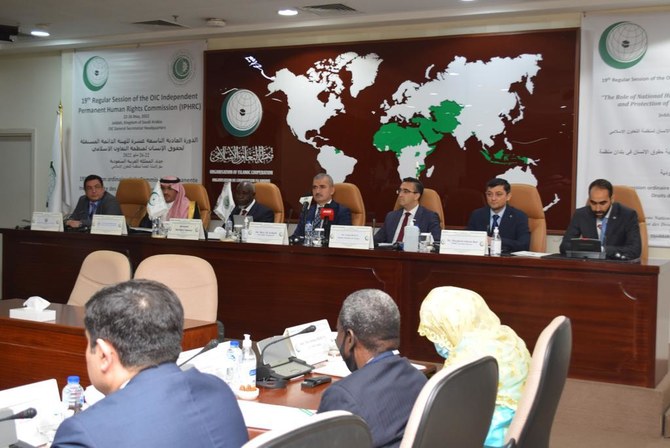JEDDAH: The 19th Regular Session of the Organization of Islamic Cooperation Independent Permanent Human Rights Commission has been meeting at the OIC headquarters in Jeddah from May 22 until 26.
On Tuesday it held a thematic debate entitled “The Role of National Human Rights Institutions in the Promotion and Protection of Human Rights in the OIC Countries.”
During the session panelists, OIC representatives and observer members of non-OIC countries have been discussing the human rights situation in the world and in the OIC countries, Islamophobia, the right to the development of women rights and more.
Marghoob Saleem Butt, IPHRC’s executive director, told Arab News that every year, they choose a prominent subject to discuss: “These sessions are an exchange of interaction on a certain subject between countries.”
Over the years, the commission has been vocal in condemning hate-motivated acts against Muslims worldwide in such places as Palestine, Kashmir, Nagorno Karabagh, India, Sri Lanka, France, Western Thrace, New Zealand and the Central African Republic.
Dr. Haci Ali Acikgul, the OIC-IPHRC’s chairperson, said: “The Commission recognizes NHRIs are a vital part of the national human rights protection mechanisms. By raising awareness, providing advice, monitoring and holding authorities to account, NHRIs play a central role in mitigating modern-day human rights challenges of discrimination and inequality as well as novel issues such as the implications of the COVID-19 pandemic on human rights of affected individuals.”
The commission considers that practical cooperation with civil society groups, especially NHRIs, can help to increase its visibility and operational outreach for the performance of its mandated tasks.
This week OIC-IPHRC signed two memoranda of understanding aimed at technical cooperation between the NHRIs of the Kingdom of Saudi Arabia and the Republic of Uzbekistan to undertake joint activities of mutual interest and strengthen institutional capacities.
The first MoU was signed by Abdulaziz Abdullah Al-Khayal, vice president of the Saudi Human Rights Commission, and the second one was signed by Mirzatilla Tillabayev, first deputy director of the National Human Rights Center of the Republic of Uzbekistan.
Al-Khayal told Arab News that every state and organization has its own definition regarding human rights, which can focus on women, children, people with disability, criminal justice, and so on. “We believe that such MoU contribute to the growth of national capabilities by exchanging knowledge between the two countries and develop the sector nationally and internationally,” Al-Khayal said.
In front of more than 30 OIC representatives and observers, presentations on the theme of the session were delivered by the five panelists. They were Dr. Eng. Mohammed Saif Al-Kuwari from Qatar, vice-chairman of the National Human Rights Committee and member of the Governance Committee of the Asia Pacific Forum; Vladlen Stefanov, head of the National Institutions, Regional Mechanisms and Civil Society section of the UN High Commissioner for Human Rights; Mazhar Hussain, director of the Economic and Social Research Department at the Statistical, Economic and Social Research and Training Center for Islamic Countries in Ankara; Ahmad Taufan Damanik, chairperson of the National Commission on Human Rights of Indonesia; and Mohammed Sabri, adviser to the Cabinet of the President of the National Human Rights Council in Morocco.
This was followed by an open discussion between the commissioners, representatives of OIC Member and Observer States, and their NHRIs.
Dr. Aboubacarr Jah, The Gambia’s deputy permanent representative at the OIC Saudi Arabia, said: “Human rights are crucial and imperative. However, it’s time to look at human wrongs and correct them.” He said the Republic of The Gambia was calling for justice for the Rohingyas of Myanmar.
“Once human rights are mentioned it is difficult to bury the ongoing Palestinian-Israeli conflict,” he said.
“Monstrous human wrongs have been perpetrated against Palestinians for 74 years today. Not 74 days, weeks, or months but 74 Years! How long is this inhuman, atrocious, and abhorrent act of inhumane aggression by the Israeli government going to go on?” he asked.
Jah stressed the importance of Muslim Ummah bonds: “United we are strong and shall win,” he said.
The commission regularly invites NHRIs of all OIC Member States to participate in its activities and encourages them to collaborate with their respective governments to hold joint activities.
Acikgul said, “I hope that today’s discussion will inspire the Member States to further intensify their commitment to strengthen the capacities and capabilities of their respective NHRIs with the overall aim of nurturing human rights-respecting and preserving societies.”
A joint IPHRC and UN High Commissioner for Human Rights workshop titled “The Role of NHRIs in International Human Rights Mechanisms” was held on Wednesday.
The commission will issue an outcome document on the topic of the thematic debate based on the week’s discussions on the final day of the session.

















